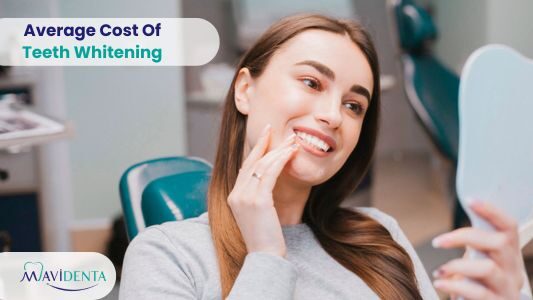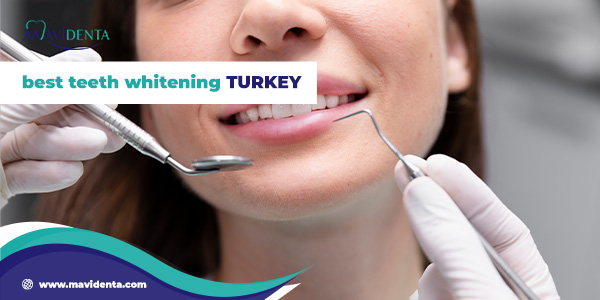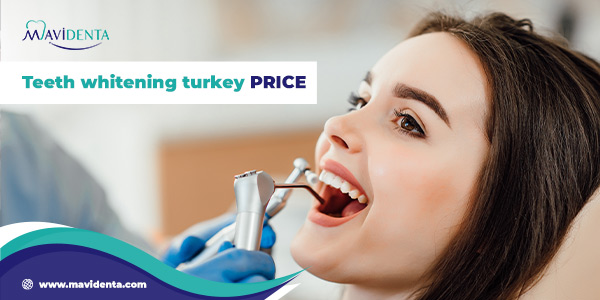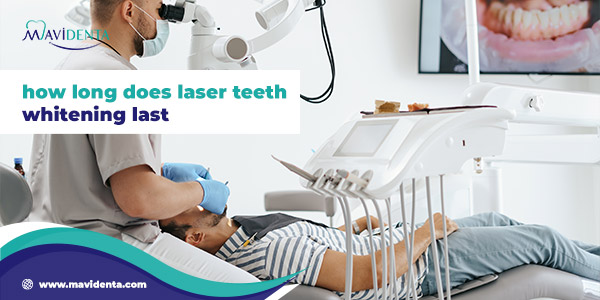A clear, white smile is a sign of Oral hygiene, attractiveness, and self-reliance. However, maintaining white teeth is not easy due to aging, eating habits, and smoking. If you want to know how to Permanently Whiten Teeth, this article will highlight whether through specialized treatments or daily care.
What is teeth permanently whitening?
Permanent teeth whitening is a term often used to describe long-term results in lightening the color of teeth and removing stains that affect the appearance of a smile.
However, it is important to clarify that “permanent whitening” does not mean that teeth will remain white forever without any change. Rather, it refers to the use of professional and effective techniques that help maintain teeth whiteness for as long as possible.
These techniques include in-office whitening sessions using lasers or strong bleaching materials under the supervision of a dentist, which penetrate the enamel layer and remove deep stains. Prescribed home whitening can also be used to maintain results after treatment. To ensure lasting results, you must follow a healthy lifestyle that includes:
- Regular tooth brushing
- Using a safe whitening toothpaste
- Avoiding staining drinks and foods, such as coffee and tea
- Stopping smoking
- Regular maintenance sessions with your dentist
So, permanent teeth whitening does not mean a permanent result, but rather a long-lasting result provided you adhere to consistent care and avoid factors that cause tooth discoloration.
Explore the best teeth straightening and whitening turkey
Can yellow teeth be permanently whitened?
Yellow teeth can be whitened and their appearance improved in a visible and effective manner. In cases of extrinsic staining resulting from consuming dark beverages such as coffee and tea, smoking, or poor dental hygiene, professional in-office whitening using a laser or medical bleaching materials can provide excellent results that last from 6 months to 3 years, and sometimes longer, depending on the individual’s lifestyle and commitment to oral care.
In cases of intrinsic staining (such as staining caused by medications, aging, or changes in the internal structure of the tooth), whitening may be less effective, and the person may need additional treatments such as veneers or crowns to achieve permanent whiteness and optimal cosmetic results. To maintain the results of whitening for as long as possible, it is recommended to:
- Brush your teeth twice daily with a toothpaste containing safe whitening ingredients.
- Floss daily to remove plaque and food debris.
- Avoid stain-causing foods and drinks as much as possible.
- Quit smoking.
- Regular follow-up and maintenance appointments with your dentist.
- Drink water after eating anything that might stain your teeth.
- Use home whitening kits recommended by your dentist to maintain the results.
How to permanently whiten teeth?

Permanent teeth whitening is a goal many people strive for to achieve a bright, long-lasting smile. Here are the most important steps for permanent or semi-permanent teeth whitening:
Start professional treatment with a dentist:
- Whitening with laser or high-concentration medical materials is one of the most effective methods.
- It is recommended that this be done under the supervision of a specialist to avoid any damage to the gums or enamel.
- The results of professional whitening can last from one to three years, depending on aftercare.
Commit to daily oral hygiene:
- Brush your teeth twice daily with a safe whitening toothpaste.
- Use dental floss and mouthwash to reduce plaque buildup that causes yellowing of teeth.
Avoid factors that cause staining:
- Reduce your intake of beverages that leave stains, such as coffee, tea, red wine, and soft drinks.
- Quit smoking, as it is one of the most common causes of yellowing of teeth.
- Continuous monitoring is essential to maintain healthy teeth and their white color.
Also Read: Same Day Teeth Cleaning and Whitening.
Bad habits that affect teeth whitening:-

After teeth whitening, the results may not last long if the individual continues to practice some bad habits that accelerate the appearance of staining and yellowing of teeth. The most prominent of these habits are:
Excessive coffee and tea consumption:
These beverages contain strong stains that accumulate on the surface of the teeth and cause rapid discoloration, especially if consumed frequently without brushing afterward.
Smoking and tobacco use:
Smoking is one of the most negative factors affecting the color of teeth. Nicotine and tar cause yellow or brown stains that are difficult to remove, even after whitening.
Neglecting Oral Hygiene:
Not brushing or flossing regularly leads to the accumulation of food debris and bacteria, causing plaque to form, which affects the color of teeth and reduces the effectiveness of whitening.
Excessive Eating of Acidic Foods:
Such as lemon, vinegar, and some citrus fruits. These foods weaken the enamel layer and make teeth more susceptible to staining and erosion.
Excessive Eating of Sweets and Sugars:
Sugar feeds bacteria in the mouth, leading to tooth decay and stains, thus affecting the whiteness of teeth.
Insufficient Water Drinking:
Not drinking enough water reduces saliva production and makes the mouth more susceptible to bacterial buildup and stains.
Using Strong Whitening Toothpastes Daily:
Some whitening toothpastes contain abrasives that can erode enamel if used excessively, making teeth more susceptible to staining.
How To Permanently Whiten Teeth.
Who can do teeth whitening?
Teeth whitening is a cosmetic procedure used to improve the appearance of your smile by removing stains and lightening the color of your teeth. Although several whitening methods are available on the market, the only person qualified and appropriate to perform this procedure is a dentist.
Only your dentist can accurately assess your oral health before whitening. They will examine your teeth and gums to ensure there are no cavities, infections, or enamel problems that could be exacerbated by the use of bleaching materials.
They can also determine the most appropriate type of whitening for you, whether in-office (with a laser or high-concentration medical gel) or by prescribing safe home whitening kits to be used under their supervision.
Some cosmetic clinics and beauty centers offer teeth whitening services, but you should be careful, as these places may lack specialized medical supervision, which could expose you to the risk of using inappropriate whitening materials that could cause severe sensitivity or permanent damage to the enamel or gums.
As for home whitening, there are products available, such as whitening strips, gels, whitening pastes, and small whitening devices. Anyone can use them, but it’s best to consult a dentist first, especially if you have fillings, crowns, gum problems, or previous sensitivity, as these products are not suitable for all cases and may lead to unexpected or uneven results.
Also Read: Teeth Whitening Turkey Price | Shine Brighter for Less
How to choose the best clinic for permanent teeth whitening?
Choosing a reliable teeth whitening clinic is an important step to ensure safe, effective, and long-lasting results. Because teeth whitening is a cosmetic procedure that requires precision and expertise, several points should be considered when choosing a clinic:
- The doctor’s competence and experience: Make sure the specialist has experience in cosmetic dentistry, preferably with recognized certifications. Inquire about the number of cases they have performed and the patient satisfaction rate.
- The clinic’s reputation and patient reviews: Read reviews and experiences of previous patients online or on social media. Positive experiences are a good indicator of the quality of service.
- Clinic Cleanliness and Sterilization: Ensure that the clinic is clean and that tools and equipment are regularly sterilized, as this is essential to maintaining your health and safety.
- Transparency in Prices: Ask about the cost of whitening, what is included in the price, and whether there are follow-up sessions. Make sure there are no hidden fees or additional charges after the treatment begins.
- Follow-up Services After Whitening: It’s best to choose a clinic that offers follow-up after the session, especially if you experience any sensitivity or want to maintain the results for as long as possible.
- Clinic Location and Accessibility: Choose a clinic that is close or easily accessible so you can attend sessions or follow-ups easily and without hassle.
How to Choose the Best Dental Implant Clinic in Istanbul?
How to Prepare for a Teeth Whitening Appointment
Proper preparation for your teeth whitening session helps you achieve the best results and avoid any complications or discomfort after the procedure. Here are the most important steps you should follow before your appointment:
Visit your dentist for a comprehensive checkup first:
Before starting your whitening session, it’s essential that your dentist examines your teeth and gums to ensure there are no cavities, infections, or gum problems. Whitening is not recommended if you have untreated oral health problems.
Get a professional teeth cleaning:
It’s recommended to get a professional teeth cleaning two or three days before your whitening session. This helps remove tartar and plaque, making the whitening results more effective and consistent.
Avoid colored foods and drinks before your appointment:
In the days before your session, try to limit your intake of coffee, tea, dark sauces, and soft drinks to avoid further staining of the teeth.
Tell your doctor if you experience tooth sensitivity:
If you experience sensitivity when drinking cold or hot drinks, inform your doctor so they can take precautions during the whitening procedure and choose the most appropriate materials for your condition.
Avoid home whitening before your appointment:
Since you may need to avoid colored foods or drinks after the session, it’s best to eat a light, balanced meal before heading to the clinic.
Explore Same Day Teeth Cleaning and Whitening.
Mavidenta Advantages in Teeth Whitening Treatment in Turkey
At Mavidenta, teeth whitening isn’t just a quick cosmetic procedure; it’s a comprehensive treatment experience aimed at improving the appearance of your smile in a safe, effective, and long-lasting manner. The clinic offers professional whitening services using the latest laser technology and high-quality medical gels, providing patients with immediate and noticeable results from the first session, without causing damage to the enamel layer or excessive sensitivity.
The difference at Mavidenta begins from the moment you enter. A comprehensive examination of your teeth and gums is performed to ensure your teeth are suitable for whitening. Then, your teeth are professionally cleaned to remove tartar and plaque, ensuring more consistent and effective results. Our dentists use internationally approved whitening products, making the procedure completely safe, even for those with sensitive teeth.
The clinic also customizes the session to suit each patient’s needs, both in terms of the duration of the whitening procedure and the type of technique used, to provide personalized solutions to suit each smile. After the session, the patient receives precise dental care instructions to maintain the results, and a follow-up session can be booked to enhance the whitening if needed.
One of the most notable features of the whitening experience at Mavidenta is that it is performed under the supervision of a select group of dentists specializing in cosmetic dentistry, ensuring you have natural, safe, and long-lasting results while feeling completely comfortable and confident throughout the treatment.
Also Read: How Long Does Laser Teeth Whitening Last?
What protection procedures to follow after teeth whitening?
After teeth whitening, teeth are at their most sensitive, and the enamel surface is temporarily more resilient to color absorption. Therefore, following these post-whitening instructions is important to maintain the results as long as possible and avoid any damage or rapid discoloration.
Abstain from colored foods and drinks for 48 hours:
During the first two days, completely avoid the following:
- Coffee, tea, red wine, cola
- Chocolate, ketchup, curry, and dark sauces
- Smoking or using nicotine
This is when teeth are most sensitive and may absorb color more easily.
Drink only water or light-colored beverages:
Water is the best choice for the first 48 hours. You can also drink milk or clear juices, such as apple juice, as long as they are free of dyes.
Brush your teeth gently and regularly:
- Use a soft brush and toothpaste specifically designed for whitening teeth.
- Avoid strong or whitening toothpastes containing abrasives to avoid weakening the enamel.
Avoid acidic foods:
Such as lemon, vinegar, citrus fruits, and carbonated drinks, as they can increase tooth sensitivity and affect the enamel layer.
Use a straw when drinking beverages later:
If you want to return to drinks that may stain your teeth, use a straw to reduce their contact with the front surfaces of your teeth.
Quit smoking completely:
Smoking is one of the fastest causes of yellowing of teeth, so it’s best to quit completely, especially after whitening.
Also Read: Transform Your Smile with Advanced Turkey Teeth Straightening
Conclusion
Although there is no way to guarantee permanent, lifelong teeth whitening, you can maintain the results for a long time through a combination of professional treatments and daily oral care. Avoiding staining foods and drinks, maintaining good oral hygiene, and quitting smoking are key steps to maintaining your bright smile. Remember, continued care is key to maintaining lasting results.
consultation at Mavidenta Clinic.
FAQs
Can teeth be whitened permanently?
Teeth whitening cannot be done completely permanently, but the results can be maintained for a long time with proper care.
What are the most effective methods for long-lasting teeth whitening?
Professional treatment in a dental office, combined with good oral hygiene and avoiding the causes of staining, produces long-lasting results.
Do whitening treatments harm teeth?
Most whitening treatments are safe when performed under the supervision of a dentist and do not harm tooth enamel when used correctly.
How long do whitening results typically last?
The results can last from several months to years, depending on your lifestyle and consistent dental care.
Can teeth whitening be done at home effectively?
Yes, there are effective home products, especially those recommended by a dentist, but they may not last as long as professional results.







